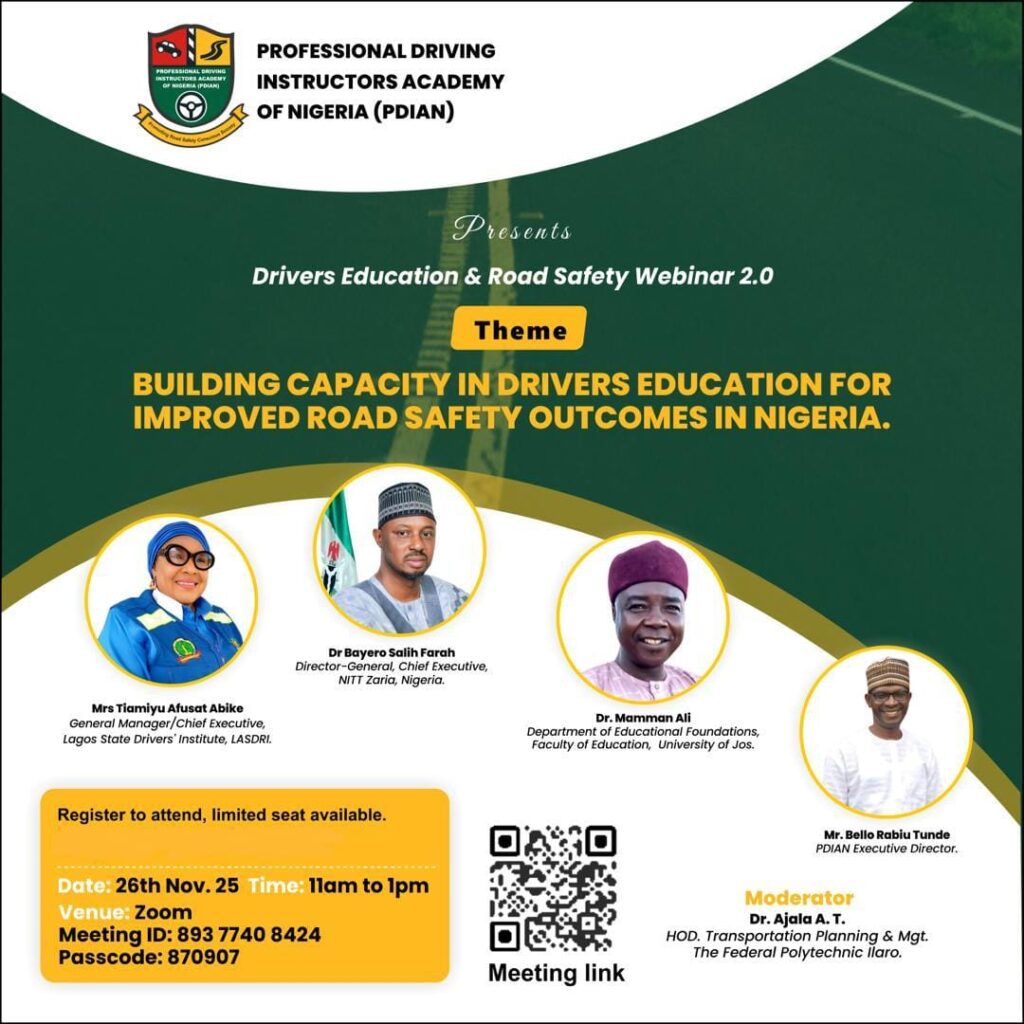Aishah Waliyullah
The Professional Driving Instructors Academy of Nigeria (PDIAN) has renewed calls for a uniform national curriculum for all driving schools, warning that Nigeria’s fragmented driver-training system is fuelling the high rate of road crashes attributed largely to human error.
The academy made the appeal during its second Drivers Education and Road Safety Webinar held on Wednesday, monitored by PLATFORM TIMES, with the theme “Building Capacity in Drivers Education for Improved Road Safety Outcomes in Nigeria.”
PDIAN said the absence of standardized instruction across the country has created a dangerous gap in driver competence, exposing millions of Nigerians to preventable road crashes.
Addressing participants, the General Manager/Chief Executive of the Lagos State Drivers Institute (LASDRI), Mrs. Afusat Tiamiyu, criticised the widespread practice of learning driving informally rather than through certified driving schools.
According to her, many Nigerians obtain licences without receiving proper training, a trend she described as alarming.
“Drivers’ training is very important and driver education should start from driving school. But the fact that most don’t attend driving school means the situation needs to be re-examined,” she said.
“Husband teaches wife, wife teaches husband — but this should not be.”
Tiamiyu advocated a modernised, behaviour-based curriculum that incorporates cultural attitudes, discipline, and road-use ethics.
She also called for improved training institutions, strengthened instructor capacity, integration of technology, and mandatory professional certification for commercial drivers.
Highlighting the Lagos model, she added: “we in Lagos State have a uniform training curriculum for all driving schools. I appeal to all states to take the issue of drivers’ education seriously.”
Also speaking, the Director of the Nigerian Institute of Transport Technology (NITT), Joshua Odeleye, revealed that research shows human error remains the leading cause of road accidents, contributing nearly 80 per cent of all crashes.
“There should be training and retraining of road users because the road is unsafe at any speed,” he warned.
Odeleye stressed the need to standardise driving nationwide, saying drivers are vital to the country’s economic system. He expressed particular concern over long-distance truck drivers, many of whom operate without supervision.
“Fatigue is a major issue among truck drivers, and there is no one to check if they rest at intervals or even if they drink while driving. As we develop a curriculum for driving lessons, there should be active bodies enforcing road laws.”
A lecturer at the University of Jos, Dr. Mamma Ali, emphasised that the quality of drivers on Nigerian roads cannot improve without deliberate and sustained capacity-building efforts.
“The goal of driver education is to prepare new drivers to obtain a licence and to be competent and responsible on the road,” he said.
“It is with capacity building that we strengthen the skills and knowledge individuals need.”
He commended Lagos State for its “bold initiative” in implementing a uniform curriculum for its driving schools.
In his welcome address, the Head of Department, Transportation Planning and Management at the Federal Polytechnic, Ilaro, Dr. Abdul Rahman Ajala, warned that progress in drivers’ education will remain slow without collective action.
“We must not work in silos, we must collaborate,” he cautioned.
Ajala, who also moderated the session, cited Federal Road Safety Corps (FRSC) data showing that Nigeria had 815 registered driving schools in 2015, increasing to 1,299 by 2021. However, he said many of these schools have since shut down due to operational challenges.
Participants at the webinar unanimously agreed that human behaviour remains the biggest threat to road safety in the country. They lamented that many Nigerians obtain drivers’ licences without proper training, creating a “huge and dangerous gap” in competence.
The stakeholders concluded that without a uniform national curriculum and strict enforcement of training standards, Nigeria would continue to suffer heavy losses to road accidents driven largely by human error.
Do you want to share a story with us? Do you want to advertise with us? Do you need publicity for a product, service, or event? Contact us on WhatsApp +2348183319097 Email: platformtimes@gmail.com
We are committed to impactful investigative journalism for human interest and social justice. Your donation will help us tell more stories. Kindly donate any amount HERE




